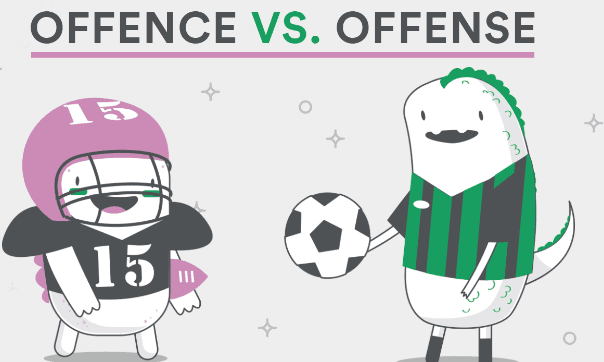Navigating the Language Maze: Understanding 'Offence' vs 'Offense'

English is full of words that sound similar but have different meanings and spellings. These homophones can often be a point of confusion, especially for non-native speakers.
This blog post aims to explain the usage of 'offence' vs 'offense'. We'll explore their spellings in British and American English and guide you on how to use these terms. Let's start.
Setting the Scene: Why Does Spelling Matter?
Spelling plays a crucial role in communication. Small differences in spelling can change meanings and lead to miscommunications.
Consider the words ‘desert’ and ‘dessert’. A single 's' difference completely alters their meanings.
Spelling variations are common across regions. As an Indian English learner, it's important to distinguish between British and American influences.
Let's consider Rajesh, an IT professional. He was writing an important email to his American client but used British spellings throughout. This confused his client as he was not familiar with UK English variations. Rajesh's professional image was affected negatively as his message came across as unprofessional.
The Twins: Offence vs Offense - A First Look
'Offence' and 'offense' may seem identical, but they differ slightly in spelling and usage. Both terms originate from Old French 'offense', meaning a crime or wrong action.
In the English language, the term 'offence' is defined as a breach of law or rule; an illegal act 'Offense' has the same meaning, but it's spelt differently depending on where you are.
The difference lies in regional spellings:
'Offence' is used in British English (commonly used in India).
'Offense' is followed in American English.
Here's a concise table that gives a comparative view:
Offence | Offense | |
Definition | A breach of law or rule; an illegal act | An act or instance of offending someone |
Origin | Derived from Old French | Derived from Old French |
Spelling Usage | British English (also followed in India) | American English |
This shows how the same word can be spelt differently based on regional preferences without changing its meaning.
Exploring The Differences: British Vs American English

It's fascinating to see how English varies across the globe! The differences between British and American English are particularly intriguing. While both versions share the same roots, they have evolved differently. This leads to variations in spelling, pronunciation, vocabulary, and even grammar.
Here's a quick snapshot of common word variations:
Colour (British) vs Color (American)
Centre vs Center
Organise vs Organize
These distinctions are not just linguistic - they reflect cultural and historical shifts.
Spotting Offences and Offenses: Usage in Sentences
Let's look into some examples to understand the usage of 'offence' and 'offense'. Consider these sentences with ‘offence’ (British English):
"The batsman took offence when the umpire ruled him out."
"In professional settings, a lack of punctuality might be considered an offence."
Similarly, let's look at how 'offense' is used in common American English scenarios:
"The coach devised a new offense strategy for the football game."
"On the basketball court, a strong offense is as important as a good defence."
Navigating English: Tips for Mastering Spelling Variations
Mastering spelling variations like 'offence' and 'offense' may seem intimidating, but there are useful tips to make it simpler. Here are three practical ways to remember the correct usage of these words:
Know the difference:
The term 'offence' is used in British English, while 'offense' is American English. Since, in India, we generally follow British English, use 'offence'.
Create associations:
Establish mental connections with familiar concepts. For instance, 'e' in offence can be associated with the 'e' in England.
Use them in sentences:
Use both terms in different sentences to understand their use better. For instance, "The offence committed by the robber was severe," versus "The offense committed by the robber was severe."
Don't forget, practising often can make you better at spelling in English and more confident when speaking.
Why Clapingo is Your Perfect English Learning Companion?
Navigating English confusions like 'offence' vs 'offense' is easier with Clapingo's tailored coaching. Designed for Indian professionals, Clapingo provides personalized sessions with native tutors who understand your challenges. Overcome language hurdles with relatable examples, making learning effective and enjoyable.
Key Takeaways
Knowing the difference between 'offence' and 'offense' is more than just learning English; it improves your communication, helps you express yourself clearly, and boosts your confidence.
'Offence' is mostly used in British English, while 'offense' is in American English.
Practice is essential to get these right. For personalised guidance tailored to your needs, consider platforms like Clapingo that offer one-on-one coaching with native English speakers.
FAQs
1. Is 'offence' or 'offense' the correct spelling?
Both 'offence' and 'offense' are correct spellings, but their usage depends on the geographical locale. In India, following British English, the term 'offence' is preferred. So, if you're writing a formal letter or a business document in India, use 'offence'.
2. Can I interchangeably use 'offence' and 'offense'?
Technically yes, but it's better to stick to one style of English consistently. If you're in India or any other country that follows British English, then use 'offence'. If you're writing for an American audience or following American English rules, use 'offense'.
3. Does the difference between 'offence' and 'offense' affect comprehension?
No, the difference does not impact comprehension as both terms have the same meaning. Whether you write offence or offense, your reader will understand that it means an act of breach or violation. Also, in spoken English both spellings have the same pronunciation.
4. Why does such a spelling difference exist?
The difference in spelling between 'offence' and 'offense' comes from how British and American English have evolved differently over time. In British English, many words end with '-ce,' while in American English, they end with '-se.'
Comments
Your comment has been submitted